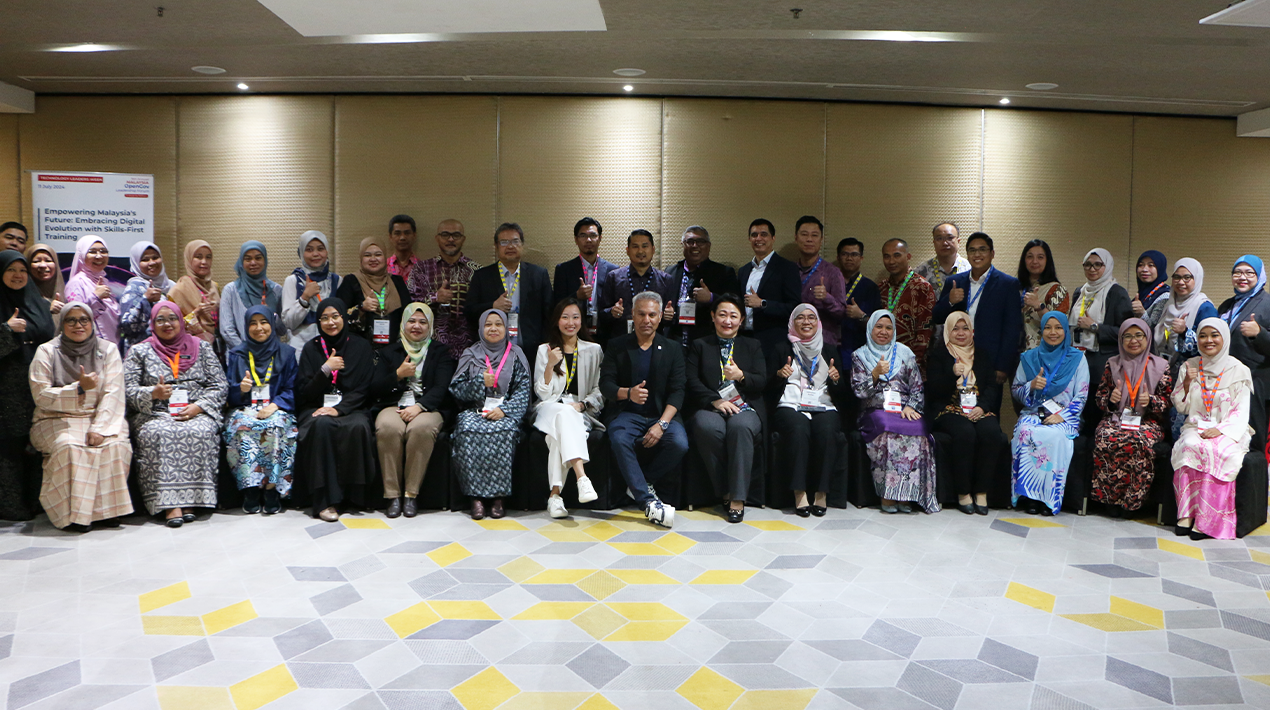
|
Getting your Trinity Audio player ready...
|
In an era marked by rapid technological advancements, Malaysia stands on the cusp of a transformative economic surge. The integration of disruptive technologies like Generative AI is set to boost the country’s financial capacity by a staggering US$ 113.4 billion, mainly benefiting the industrial sector. As Malaysia gears up for this digital revolution, equipping the workforce with essential expertise and knowledge becomes imperative, especially in the labour-intensive industrial industry.
 The demand for digital marketing, cybersecurity, data analytics, and artificial intelligence expertise is rapidly increasing. Malaysia must prioritise skilling and upskilling in these emerging technologies to enhance global competitiveness, support innovation, and drive economic growth. Additionally, the global shift towards remote and hybrid work models highlights the necessity of skill-based learning. With Malaysia being home to the 14th largest population of remote workers, equipping professionals with the skills needed to compete globally is crucial.
The demand for digital marketing, cybersecurity, data analytics, and artificial intelligence expertise is rapidly increasing. Malaysia must prioritise skilling and upskilling in these emerging technologies to enhance global competitiveness, support innovation, and drive economic growth. Additionally, the global shift towards remote and hybrid work models highlights the necessity of skill-based learning. With Malaysia being home to the 14th largest population of remote workers, equipping professionals with the skills needed to compete globally is crucial.
A skill-first learning approach has emerged as a pivotal strategy to navigate the challenges and seize the opportunities presented by this dynamic digital landscape. Individuals are empowered to thrive in evolving industries by emphasising skills development, which fosters resilience and sustainable growth.
Research shows the economic benefits of advanced digital skills, with APAC workers earning, on average, 65% more than their less digitally skilled counterparts. This underlines the importance of skill-first learning, an innovative education method focusing on practical skills development throughout one’s career.
In Malaysia, skill-first learning is gaining traction, prioritising problem-solving, critical thinking, experiential learning, and adaptability to prepare individuals for diverse professions through formal education, employment training, and on-the-job learning
Digital upskilling is not only essential for industrial growth but also for driving change in the public sector. Over 80% of global leaders invest in employee digital skills training to maintain competitiveness. Governments are also making significant investments, with projections indicating a global expenditure of US$3.6 trillion by 2026 on similar programmes. These investments enhance public service efficiency, foster innovation, and fuel economic growth by improving workforce capabilities and leveraging digital technology.
 Organisations like GenAI Academy are at the forefront of this transformation, preparing employees to redefine their careers in a rapidly changing environment. Through innovative training programmes and customised learning experiences, individuals are equipped to adapt to and thrive in the digital era, embracing change and driving Malaysia’s progress towards a digitally skilled future.
Organisations like GenAI Academy are at the forefront of this transformation, preparing employees to redefine their careers in a rapidly changing environment. Through innovative training programmes and customised learning experiences, individuals are equipped to adapt to and thrive in the digital era, embracing change and driving Malaysia’s progress towards a digitally skilled future.
The 9th Malaysia Annual OpenGov Leadership Forum on 11 July 2024 at Dorsett Putrajaya, convened industry leaders, policymakers, and educators to explore strategies for fostering a digitally skilled workforce, focusing on digital transformation and skill-first learning.
Key sessions highlighted the importance of integrating digital skills training into educational curricula, the role of public-private partnerships in driving innovation, and the impact of remote work trends on the future job market. Forum participants also reviewed successful case studies and best practices from other countries, gaining valuable insights on how Malaysia can enhance its digital skills ecosystem.
The event emphasised the importance of continuous learning and adaptability in an ever-changing digital landscape to ensure Malaysia’s global competitiveness. As Malaysia embraces digital evolution, the commitment to skill-first training is crucial for unlocking the country’s full economic potential. By investing in a highly skilled and adaptable workforce, Malaysia is poised to lead in the digital age, driving innovation, economic growth, and social progress.
Opening Remarks

Mohit Sagar, CEO and Editor-in-Chief at OpenGov Asia agrees that Malaysia has all the makings of a prosperous digital nation thanks to its dynamic economy, vast pool of skilled workers, and advantageous location in the centre of Southeast Asia. The government’s initiatives, such as MyDIGITAL and the Digital Economy Blueprint, underscore its commitment to digital transformation.
Furthermore, Malaysia’s rich cultural legacy encourages innovation and creativity, essential for thriving in a technology-dominated world. By capitalising on these advantages and investing in skills-first training programmes, Malaysia can establish itself as a regional leader in the digital economy, fostering innovation, generating high-value employment, and enhancing its citizens’ living standards.
Despite its potential, fully embracing digital transformation presents several challenges for Malaysia. Infrastructure constraints, such as unequal access to high-speed internet in rural areas, complicate widespread digital adoption.
Mohit also believes that organisational and cultural barriers may hinder progress, as many industries may need to be more adaptable or possess the requisite digital literacy. Bridging the digital divide between various groups is essential for equitable access to digital technology and opportunities.
In a rapidly evolving landscape, citizens must be equipped to both participate in and benefit from the transformation. Data indicates that APAC workers with advanced digital skills earn, on average, 65% more than those lacking such skills, with 57% of intermediate and 39% of essential digital workers also commanding higher earnings than their non-digital counterparts.
This highlights the critical importance of skills-first training, which promotes the development of practical, industry-relevant skills over traditional academic achievements. As such, skills-first training is pivotal to Malaysia’s digital future for several reasons:
- It bridges the gap between the skills demanded by the rapidly evolving digital economy and those offered by traditional educational institutions. By focusing on skills such as digital literacy, problem-solving, and adaptability, skills-first training prepares individuals to thrive in the digital age.
- It promotes inclusion by providing employment opportunities for people from diverse backgrounds, regardless of their formal education level. This approach enhances employee productivity and competitiveness and fosters social mobility and economic empowerment.
- Skills-first training is essential for developing a future-ready workforce capable of driving Malaysia’s digital transformation and sustaining its growth in the global digital economy.
“The digital landscape is evolving rapidly, with specific industries requiring specialised skills to drive innovation and growth,” he adds. “Artificial intelligence (AI), with its potential to revolutionise numerous sectors, demands highly qualified experts in neural networks, machine learning, and natural language processing to develop intelligent systems and methodologies.”
Additionally, the burgeoning field of data science plays a crucial role in extracting valuable insights from vast amounts of data. Proficiency in machine learning, statistical modelling, and data analytics is essential to leverage data for organisation outcomes and informed decision-making.
As the digital environment becomes more vulnerable to cyberattacks, cybersecurity emerges as another critical area. Skilled cybersecurity professionals are needed to protect sensitive data and defend against malicious attacks on digital infrastructure.
The value of lifelong learning and continuous skill development cannot be overstated. As technology evolves, individuals must adapt to stay relevant and competitive. Continuous training helps professionals keep up with industry trends, acquire new knowledge, and enhance skills, enabling them to tackle emerging challenges and seize opportunities.
The absence of skills-first training in Malaysia’s digital evolution could create a gap between workforce skills and digital economy demands. Traditional education models would struggle to keep pace, resulting in a mismatch between job requirements and available talent, hindering innovation and growth in critical sectors like AI, cybersecurity, and data science.
Industries reliant on these technologies would struggle in global competition, hindering Malaysia’s economic growth and technological progress. Without skills-first training, socioeconomic inequalities could worsen, limiting social mobility and increasing organisation disruptions, leading to economic slowdowns and job losses.
“The fundamental challenge is the need to elevate Malaysia’s comprehensive blueprint, specifically by focusing on improving our workforce’s capabilities,” Mohit is convinced. “Through our OpenGov Academy, we are committed to supporting this endeavour by offering extensive training programmes aimed at upgrading digital skills.”
Prioritising skill development ensures worker creativity, agility, and readiness for the digital economy, enhancing employability and economic resilience. By fostering continuous learning and adaptability, Malaysia can navigate the digital age’s complexities and secure a prosperous future for its citizens.
“Given the speed at which technology is developing, a suitably equipped population is essential,” Mohit summarises. “For Malaysia to be prosperous in the future and competitive in the digital economy, it is strategically vital to invest in skill development.”
Welcome Address

Eklavya Bhave, Director and Sales Head for Asia Pacific at Coursera for Government, highlights the significant influx of digital technologies into Southeast Asia’s public sector in recent years. Technologies such as Gen AI, automation, and data analytics are transforming nearly every industry, creating an urgent need for reskilling.
Upskilling is intrinsic to digital transformation, Eklavya believes. With a growing demand for skilled personnel in digital marketing, cybersecurity, data analytics, and artificial intelligence, Malaysia must prioritise skilling and upskilling. Focusing on developing expertise in emerging technologies will enhance Malaysia’s global workforce competitiveness, support innovation, and contribute to economic growth.
“In Malaysia, technology is advancing more quickly than the workforce, resulting in a smaller pool of workers skilled in new technologies compared to the demand,” Eklavya states. “Moreover, the increase in remote work has swiftly transformed professions in both the private and public sectors.”
Malaysia, ranking 14th globally in remote worker population, must empower professionals with skills essential for global competitiveness. By harnessing technology to link workers with international opportunities, Malaysia can lead in advancing the remote work trend, driving economic growth and enhancing workforce inclusivity.
Private sector companies are turning to digital solutions to streamline services, while public sector innovations seek to drive efficiencies in stretched teams. However, many employees need to gain the necessary skill set to operate new technologies in the workplace. This gap affects employee progression, with nearly a third believing they have yet to receive a promotion or pay rise due to a lack of digital skills.
Leaders have a responsibility to recognise the increasing digital skills gap within their organisations and take necessary steps to address it – either through external IT teams or by leveraging talent within the organisation. Failure to manage effective digital skills training can lead to retention challenges, as user friction and a lack of understanding of tools and equipment can impact an employee’s desire to stay with the company.
Organisations that neglect to actively monitor productivity and progress after implementing new processes expose themselves to avoidable risks. Instead, leaders should view investing in personalised upskilling and training as a chance to optimise the value of new tools and enhance the professional capabilities of their workforce.
In fact, research shows that effective reskilling efforts can boost productivity by 6% to 12%. It stands to reason, then, that organisations should prioritise monitoring staff perceptions and attitudes towards new processes, offering upskilling opportunities accordingly. Ignoring this aspect can quickly lead to a frustrated workforce.
In light of diverse skill levels and new technologies, adopting a one-size-fits-all approach based on preconceived notions about staff’s proficiency with modern technology proves ineffective. Public sector leaders should not assume that some employees are naturally equipped with the necessary skills and knowledge to use new technologies and processes proficiently. Companies must identify all employees needing support, as even high-performing staff require training to effectively utilise new tools and solutions.
The returns for organisation leaders who invest in the right training are clear, particularly during periods of high prices and inflation. Providing workers with the right upskilling opportunities can drive employee engagement, satisfaction, and retention, ensuring they grow alongside digital transformation at work.
“When organisation leaders embrace this forward-thinking approach, they are more equipped to monitor and address skills gaps within their organisation,” Eklavya explains. “This not only aids employees in their daily roles but also empowers them to evolve into digital experts driving future growth.”
Closing Remarks
Mohit acknowledged the delegates who attended the session, recognising their commitment to upskilling the workforce. Their active participation is indicative of the importance of continuous learning and development in today’s rapidly evolving digital landscape.
“In an era marked by rapid technological advancements, the ability to adapt and enhance skill sets is paramount,” Mohit states. “Your presence here today underscores our shared recognition of the essential role upskilling plays in our professional lives and the broader economy.”
Reiterating the necessity for organisations to create a culture of continuous learning, he believes that employees should be encouraged and supported to develop new skills. This approach not only enhances individual career prospects but also drives organisational growth and innovation.
“By fostering an environment that prioritises learning and development, companies can ensure they remain competitive in an increasingly digital world. It’s not just about keeping up with change, but about leading it,” Mohit adds. “Organisations that invest in their employees’ growth are better equipped to harness the potential of new technologies and respond to market demands effectively.”
Moreover, collaboration between the public and private sectors is crucial to advancing this agenda. Together, they can develop comprehensive training tailored to the specific needs of diverse industries, ensuring that employees at all levels, from entry-level to executive positions, have opportunities to enhance their digital competencies.
“Coursera exemplifies the power of partnership in fostering a skilled and resilient workforce,” Mohit says.”By leveraging the expertise of top educational institutions and industry leaders, we can equip the workforce with the knowledge and skills necessary to thrive in the digital age.”
Mohit highlights that Coursera facilitates transformation through its access to world-class courses and training programmes, enabling employees to learn independently and apply new skills directly in their roles. Its digital learning platforms offer a flexible and scalable solution to upskilling challenges, removing barriers to education and enabling individuals worldwide to acquire essential skills regardless of their location or schedule.
Mohit is optimistic for the future, noting that with the right investments in upskilling, Malaysia and the wider Southeast Asian region could become leaders in the global digital economy, “Together, we can build a future where technological advancements lead to inclusive and sustainable economic growth.
















